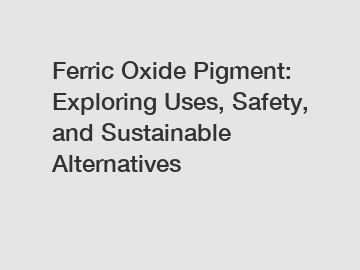Ferric Oxide Pigment: Exploring Uses, Safety, and Sustainable Alternatives
Ferric Oxide Pigment: Exploring Uses, Safety, and Sustainable Alternatives.
Ferric oxide pigment, also known as iron oxide pigment, is widely used in various industries such as construction, coatings, plastics, and ceramics. In fact, it is one of the most commonly used pigments due to its vibrant colors and high stability. However, there are growing concerns about the safety of ferric oxide pigment and its environmental impact. In this article, we will explore the uses of ferric oxide pigment, discuss its safety profile, and explore sustainable alternatives.
Uses of Ferric Oxide Pigment.

Ferric oxide pigment is primarily used as a colorant in paints, coatings, plastics, and ceramics. Its bright and durable colors make it a popular choice for manufacturers looking for long-lasting and vibrant pigments. In the construction industry, ferric oxide pigment is used in concrete to add color and improve the aesthetic appeal of buildings. In cosmetics, it is used as a colorant in various products such as lipsticks and eyeshadows. Overall, ferric oxide pigment plays a crucial role in enhancing the visual appeal of various products.
Safety Profile of Ferric Oxide Pigment.
While ferric oxide pigment is generally considered safe for use in products intended for external use, concerns have been raised about its safety in cosmetics and food applications. Studies have shown that certain forms of ferric oxide pigment may contain heavy metals such as lead, cadmium, and arsenic, which can pose a risk to human health. In addition, the inhalation of ferric oxide pigment particles can cause respiratory problems and lung damage. As a result, regulatory authorities have imposed limits on the use of ferric oxide pigment in certain applications to protect consumer health.
Sustainable Alternatives to Ferric Oxide Pigment.
Given the potential health and environmental risks associated with ferric oxide pigment, manufacturers are increasingly looking for sustainable alternatives. One promising alternative is natural pigments derived from plant-based sources such as fruits, vegetables, and minerals. These natural pigments not only offer vibrant colors but also have a lower environmental impact compared to synthetic pigments. In addition, advances in biotechnology have enabled the production of bio-based pigments using sustainable processes. By switching to sustainable alternatives, manufacturers can reduce their carbon footprint and contribute to a healthier and more environmentally friendly future.
In conclusion, ferric oxide pigment is a versatile and widely used pigment in various industries. However, concerns about its safety and environmental impact have prompted manufacturers to explore sustainable alternatives. By understanding the uses, safety profile, and sustainable alternatives to ferric oxide pigment, we can make informed choices to protect human health and the environment. Let's work together towards a more sustainable and responsible future.
The company is the world’s best Iron Oxide Pigment Supplier, iron oxide pigment for industry, iron oxide pigments for paper supplier. We are your one-stop shop for all needs. Our staff are highly-specialized and will help you find the product you need.
195
0
0

Comments
All Comments (0)